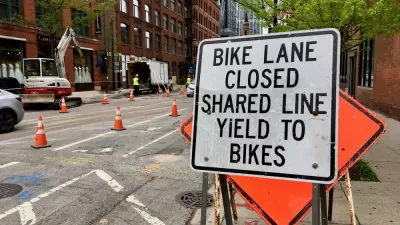Chicago has its first “comprehensive plan” since the 1960s, but without a land use map, the “We Will Chicago” plan is devoted more to laying out the issues and challenges facing the city than setting new policies.

The Chicago Plan Commission unanimously approved the “We Will Chicago” plan on February 16, marking the city’s first comprehensive planning effort since the 1960s. The document is not as robust as traditional comprehensive plans, however, and is described by the Chicago Plan Commission as a “framework plan.”
David Roeder broke the news of the new plan for the Chicago Sun-Times, describing some of the features of the new plan while also noting the document’s limitations. So, for example, the plan “follows overarching themes of equity and resilience and seeks to address discriminatory practices of the past that harmed largely minority neighborhoods and pushed some middle-class residents out of Chicago.”
“The plan highlights data showing the impact of redlining in mortgage loans, the differences in wealth and health across neighborhoods and the preponderance of pollution in poor areas, among other measurements that distinguish the haves from the have-nots,” adds Roeder.
In all, the plan speaks to eight “pillars”: 1) arts and culture; 2) civic and community engagement; 3) economic development; 4) environment, climate and energy; 5) housing and neighborhoods; 6) lifelong learning; 7) public health and safety; and 8) transportation and infrastructure. A land use map, found in the typical comprehensive plan, is not included.
Chicago Mayor Lori Lightfoot championed the plan, according to Roeder, and the commission adopts the document during a hotly contested mayoral election. Members of the Chicago Plan Commission caution that the framework will leave questions of specific policymaking and implementation to future administrations.
FULL STORY: ‘We Will Chicago’ plan adopted to guide city’s next decade

Alabama: Trump Terminates Settlements for Black Communities Harmed By Raw Sewage
Trump deemed the landmark civil rights agreement “illegal DEI and environmental justice policy.”

Planetizen Federal Action Tracker
A weekly monitor of how Trump’s orders and actions are impacting planners and planning in America.

Why Should We Subsidize Public Transportation?
Many public transit agencies face financial stress due to rising costs, declining fare revenue, and declining subsidies. Transit advocates must provide a strong business case for increasing public transit funding.

Understanding Road Diets
An explainer from Momentum highlights the advantages of reducing vehicle lanes in favor of more bike, transit, and pedestrian infrastructure.

New California Law Regulates Warehouse Pollution
A new law tightens building and emissions regulations for large distribution warehouses to mitigate air pollution and traffic in surrounding communities.

Phoenix Announces Opening Date for Light Rail Extension
The South Central extension will connect South Phoenix to downtown and other major hubs starting on June 7.
Urban Design for Planners 1: Software Tools
This six-course series explores essential urban design concepts using open source software and equips planners with the tools they need to participate fully in the urban design process.
Planning for Universal Design
Learn the tools for implementing Universal Design in planning regulations.
Caltrans
Smith Gee Studio
Institute for Housing and Urban Development Studies (IHS)
City of Grandview
Harvard GSD Executive Education
Toledo-Lucas County Plan Commissions
Salt Lake City
NYU Wagner Graduate School of Public Service





























